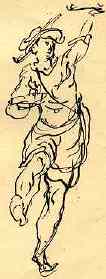Twelfth Night
Twelfth Night is considered by some to be the last of Shakespeare's "festive" comedies. A tale of shipwreck and disguise, it explores questions of gender and identity that recur from Shakespeare's early comedies to his later romances.
Topics covered in this section:
- Romantic comedy
- Disguise, gender, and identity
- Melancholy Malvolio
- Court festivities
- The end of the comedies?
See also:
- A modern text of Twelfth Night.
- An old-spelling text of Folio 1.
 A list of book facsimiles
that contain Twelfth Night.
A list of book facsimiles
that contain Twelfth Night.
- The essential facts about the play.*
Footnotes
-
Summary: facts about Twelfth Night
Written:around 1601.
First published: 1623, in the First Folio.
First mentioned: indirectly in 1601, in a letter from an Italian Duke (Orsino!), who saw Shakespeare's company perform a play at court on Twelfth Night (January 6); directly in 1602, by John Manningham, who saw the play performed for a Middle Temple feast in February of that year.Major source: Barnabe Riche's story "Apollonius and Silla" from Riche His Farewell to Military Profession (1581).
